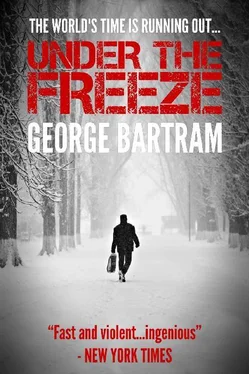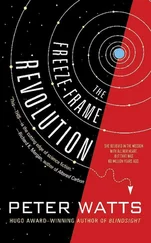He put on the comfortable old clothes and went downstairs. As he passed through the small lobby, he recognized a heavy-set, tall man by the desk. Not too long before, he had been the president of the United States. Their eyes met and politely disengaged. At the New Monroe, most people wanted to be unrecognized.
The duty man at the front door held out an umbrella. “Started to rain, sir.”
“Thanks, Jack.” He paused, one hand on the umbrella shaft, ready to open it. “I’m not here, if anybody asks.”
“Okay, glad you told me. A nightcap when you come in?”
“That would be nice. Yes, thanks.”
He walked to a bench in Lafayette Square and stood behind it next to the thick bole of a tree, where the glow of the streetlight did not fall on him. It was raining but rather warm. Cars hissed by on the shining pavement, but the little park was deserted. Tarp waited silently, motionless, trying not to think of the shame that troubled him like an ache.
At two minutes before eight, a squat figure appeared from Pennsylvania Avenue and walked slowly along one of the sidewalks. The man was wearing a dark overcoat and a hat and carried a folded and now sodden newspaper under his arm. He looked as if he earned some terrible sadness, perhaps because he was wearing thin-soled evening shoes that were useless in the inescapable puddles. When he passed near a light, the white shirtfront and black bow tie of evening dress appeared.
“Hello, Hacker,” Tarp said when the man came near.
The man raised his head to look at him under the brim of the hat. He had bags and jowls, and his little eyes looked angry. “You bastard,” he said.
“Let’s walk.”
“Do you know who I was having dinner with? Do you know what it’s like to have to excuse yourself between the drinks and the first course to the president of the United States?” He had a Georgia accent that got thicker when he was angry.
“He probably thought you were coming out to meet your Moscow contact.”
“You bastard.”
“The president knows all about you, Hacker. Come on, let’s walk.”
“What the hell you get me out here on a night like this for?” Hacker turned up his coat collar.
“Two Agency men tried to interfere in my business. That sounds like your work.”
“I don’t know a thing about that stuff.”
“Two Agency men leased a boat in Florida and followed me around the Gulf. Why?” When Hacker said nothing, Tarp prodded him with his left elbow. “Answer me, Hacker.”
“I don’t know nothin’ about it, you hear?”
“Hacker.” Tarp stopped. He held the umbrella high enough so that he could look into the other man’s eyes. Rain cascaded off it onto the other’s hat, then off the hat brim onto his shoulders and his nose and his shoes. “Hacker, when you decided to take Moscow’s money so your wife could live in that big house in Potomac, you gave up your claim to being treated like a human being. When I turned you and made you a triple agent, you at least got yourself back on the side of the angels. I can still blow your situation any time you stop cooperating. Now, why did you put your people on me, Hacker?”
Hacker hunkered down into his raincoat. “You don’t need to talk so high and mighty about Moscow money. I guess you know what Moscow money is, all right, all right. We got word you was havin’ a ron-day-voo out in the Gulf with a certain representative of a certain security service that happens to have its headquarters in Moscow, U.S.S.R.”
“What rendezvous?”
“That bigwig you met up with.”
“Who said?”
“You know I can’t tell you that.” Hacker seemed pleased. “You know you’d better. Who said ?”
They started walking again. Hacker moved closer and put one hand on the umbrella handle. “Moscow,” he whispered.
“Who in Moscow?”
“Aw, shit.” The plump man looked around as if they were in a crowd. “The usual.” His voice was almost inaudible. “Your usual officer?”
“Well, yeah.”
“Who’s at the top of your pipeline?”
“How the hell should I know?”
Tarp looked down at him, seeing only wet hat brim. “What rank are you now in the KGB, Hacker — a captain?”
“Like hell! I’m a lieutenant-colonel!”
“And you don’t know who’s at the top of your pipeline? Tell me another.”
“Aw, shit. It’s Galusha.”
A lieutenant - colonel in the KGB and a section head at the Agency , Tarp thought. Not bad for a Georgia boy . “All right,” he said aloud, “I want the word to go back to Galusha that there was no rendezvous so far as your people could find out. Got it?”
“Shit.”
“And I want my boat back.”
“You’re a complete prick, you know that?”
“Yes.” They crossed a street and headed back toward the square. “I want my boat back. No strings. Same condition I left it in. Any damage, I’ll come to you personally.”
Hacker sighed deeply again. “Okay. Christ, you shot one of my best men.”
Ignoring him, Tarp said, “Next, I want the digest of atomic materials for the Southern Hemisphere for the last twenty-four months. I’ll give you a code; you can pipe it into my data bank.”
“ What ?”
“I also want satellite coverage of atomic installations in the Southern Hemisphere for the same period.”
“I can’t do that!”
“Sure you can. Remember that you’re a traitor. Traitors are very resourceful people. Think how smart you must be, working for both Washington and Moscow.”
Hacker said nothing while they took several steps. He was breathing heavily, and he stopped and looked down into a puddle that was too wide to step across. “I live for the day when I will have your ass,” he said in a strangled voice.
Tarp walked away, leaving the useful traitor in the rain.
There were fresh flowers in his room at the New Monroe and a little Fire was burning in the fireplace, above which an Adam mantel gave grace and dignity to the little space. The New Monroe was not an inexpensive hotel. Far from it. It offered rare amenities, however. For people who spent part of their lives in very uncomfortable pursuits, it was a respite, and it had the unique virtue among hotels of offering an absolute guarantee against bugs of any kind.
There was a short bookshelf with a wide range of reading material. Tarp was trying to decide between Little Dorrit and the latest Jane’s Fighting Ships when there was a knock at his door. He opened it to see a tray with a bottle of Laphroaig and two glasses, and, behind it, the man he had seen earlier in the lobby.
“You ordered a nightcap, I think.”
It was not often that room service was performed by a former president, even at the New Monroe. Tarp stepped back; the man came in, moving with a westerner’s rolling stride and the sort of boyish grin and haircut that Europeans thought of as typically American. “Mind if I join you?” he said, looking around for a place to set the tray down.
Tarp was wary. “My pleasure, sir,” he said, not very pleasantly.
The former president put the tray down and touched the top of the bottle. “Your brand, isn’t it?”
“It is, indeed.”
“They said at the desk it was.” He was wearing a cardigan sweater and leather slippers, and he stood in front of the fire looking relaxed and taking up a lot of space. “My name is Smith.” Being called Smith amused him a lot, the joke being that his name was something else, that both his name and his face were so famous that calling him Smith had a profound silliness to it.
“Mine is Tarp.”
“I know.” He looked behind him so he could lower himself into an armchair, and when he was comfortable he said, “You pour,” like a man accustomed to giving orders. He watched Tarp open the bottle. “I’ve been across the street,” he said. “Visiting the present occupant.” That seemed to amuse him, too.
Читать дальше












